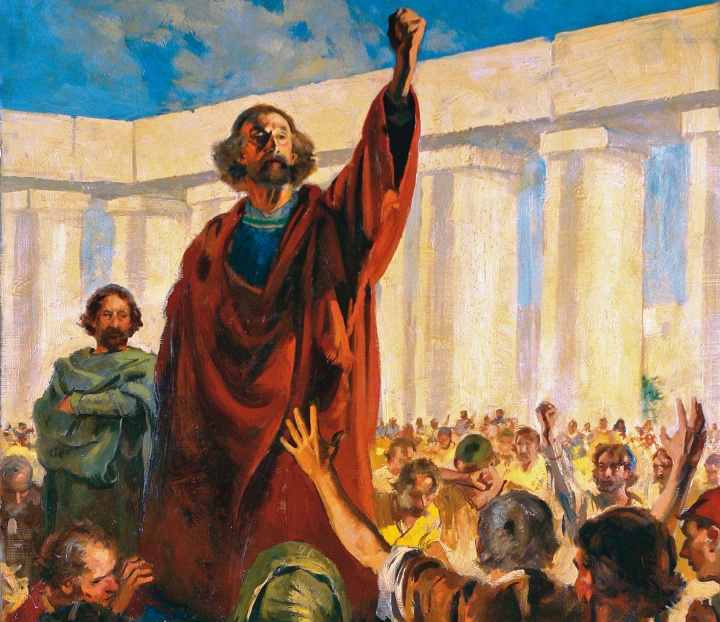Jesus said that we should “therefore pray earnestly to the Lord of the harvest…” (Matthew 9:38). The Greek word for earnestly is deomai, which means; desire, long for, ask, beg. So, when we pray to the Lord of the harvest, we should pray in earnest with strong desire, a longing for, and yes, even begging in faith for the lost and for laborers, placing our trust in the trustworthiness of the One in whom we believe.
The New Testament Model: Prayer that Leads to Evangelism
Armin Gesswein, known as “the apostle of prayer and revival,” explains the inseparability of prayer and evangelism in the New Testament:

It knows no evangelism without prayer, and no prayer which does not lead to evangelism.” (1)
Samuel Zwemer, known as the “apostle to Islam” understood the need for prayer and proclamation:
“We pray for our friends and relatives. But do we ever evangelize them? It is so much easier to talk about them to Christ than to talk to them, about Christ.”
“If faithfully, fearlessly, sympathetically, we preach Christ crucified, He can make the stumbling block of the cross a stepping stone for the Muslims into His kingdom…more than this, the cross will win their love if rightly preached.”
Praying evangelistically
If we truly care about our Muslim friends, neighbors, co-workers, and fellow students, our prayers for them will be two-fold:
2) We should pray earnestly that the “Lord of the harvest will send out laborers into His harvest” (Matthew 9:39)—these laborers would include you and me, and our brothers and sisters in Christ, that we may speak boldly, with gentleness and respect, to the lost where they are.
First, we begin by praying for the lost
The apostle Paul wrote in 2 Thessalonians 3:1, “Finally, brothers, pray for us that the message of the Lord may spread rapidly and be honored, just as it was among you.” Paul specifically asked the church in Thessalonica to pray for another people group! He asked those who had previously received the gospel to pray for others to receive and honor the gospel. So, we see that this is not a novel idea. It has been around a long time and is the first prong of the New Testament model in bringing unbelievers to Christ.
A helpful acronym to use as a prayer model is H.E.A.R.T. (2):
H—Receptivity of Heart and opening of the mind—We must pray that the Holy Spirit will begin ‘tilling the ground’ of the Muslim heart and opening their mind to the truth (Proverbs 16:1), so that when they hear God’s Word, the seed will fall on ground that is prepared and receptive. This preparation may begin with a dream, or through the realization that Muhammad lacked the character and conduct of a godly man, or receiving a copy of the New Testament and experiencing Jesus for the first time, or that the Qur’an offers no assurance of salvation, etc. As one Muslim background believer stated, “Only when I read the Qur’an in my own language, did I realize how lost I was.” Another Muslim background believer said, “I received a Bible…days later, I started reading the New Testament and fell in love with the character of Jesus. As a Muslim, I knew of Jesus, but I was unfamiliar with the miracles he had performed and the claims he had made about his status as God’s Son. Within months, I had read the Bible in its entirety. Then I read it a few more times. The more I read, the more I saw God as my true and loving Father.”
E—That God would open the spiritual Eyes of our Muslim friends. As Paul presented his commission from the Lord to king Agrippa, “to open their eyes and turn them from darkness to light, and from the power of Satan to God, so that they may receive forgiveness of sins and a place among those who are sanctified by faith in Me” (Acts 26:18). As Samuel Zwemer noted, “He (the Muslim) needs to be taught Christianity and brought into the light of Bible truth. He needs to recognise the dangerous errors of his religion and turn to Christianity as the true light from heaven.”
A—God’s Attitude towards sin. Muslims reject the doctrine of original sin, and as such believe that sin is not hereditary and no one is born a sinner. Islam’s view of sin explains why Muslims reject the Christian doctrine of Christ’s atoning sacrifice. We need to pray that the Holy Spirit will convict our Muslim friends of their sin (John 16:8–11), and reveal to them their lostness and hopelessness without the “one mediator between God and men, the man Christ Jesus, who gave himself as a ransom for all” (1 Timothy 2:5–6).
R—Released to know and trust Christ. Jesus affirmed His messianic mission of releasing the spiritual captives and oppressed: “The Spirit of the Lord is upon me, because he has anointed me…to proclaim liberty (release/freedom) to the captives…to set at liberty (release) those who are oppressed” (Luke 4:18). We must pray that our Muslim friends will be released from seeing Isa/Jesus as only a prophet, and that their eyes will be opened to see Jesus for who He truly is, the Jesus of the New Testament who is “the Way, the Truth and the Life” (John 14:6). Then Jesus said, “If you abide in my word, you are truly my disciples, and you will know the truth, and the truth will set you free…So if the Son sets you free, you will be free indeed.” (John 8:31–32; 36)
T—A life Transformed by the Gospel. 2 Corinthians 5:17 reminds us that “if anyone is in Christ, he is a new creation; the old has gone, the new has come.” And in Colossians 3 we are told, “and have put on the new self, which is being renewed in knowledge after the image of its creator. Here there is not Greek and Jew, circumcised and uncircumcised, barbarian, Scythian, slave, free; but Christ is all, and in all (v. 10–11). Once our Muslim friends have come to faith in Christ, we need to pray that He will bestow upon them the courage and perseverance to follow Jesus, even when it potentially means loss of family, future, or even life.
Second, “…therefore pray earnestly to the Lord of the harvest to send out laborers into his harvest.” (Matthew 9:38)
Pray for Workers—this is our most basic prayer.
“Do you not say, ‘There are yet four months, then comes the harvest’? Look, I tell you, lift up your eyes, and see that the fields are white for harvest.
Already the one who reaps is receiving wages and gathering fruit for eternal life, so that sower and reaper may rejoice together. For here the saying holds true,
‘One sows and another reaps.’ (John 4:35–37)
Jesus could not have been clearer—it is never the harvest that is lacking, the lack is in the labor force, and this is where Jesus says to focus our prayers. We must strive to be imitators of Paul as he was of Christ (1 Corinthians 11:1; 4:16) by taking up our office of ambassadorship, “Therefore, we are ambassadors for Christ, God making his appeal through us” (2 Corinthians 5:20). Let us not say, “Here I am Lord, send my brother or sister,” but instead, let us boldly claim as Isaiah did, “And I heard the voice of the Lord saying, ‘Whom shall I send, and who will go for us?’ Then I said, ‘Here I am! Send me’” (Isaiah 6:8).
Paul as he was of Christ (1 Corinthians 11:1; 4:16) by taking up our office of ambassadorship, “Therefore, we are ambassadors for Christ, God making his appeal through us” (2 Corinthians 5:20). Let us not say, “Here I am Lord, send my brother or sister,” but instead, let us boldly claim as Isaiah did, “And I heard the voice of the Lord saying, ‘Whom shall I send, and who will go for us?’ Then I said, ‘Here I am! Send me’” (Isaiah 6:8).
We must pray that the Lord will raise up more laborers in the Church, that more and more Christians will embrace the compassion for the lost that both Jesus and Paul manifested (Matthew 9:36; Romans 10:14-15), and that this compassion will translate into ambassadorship leading to an authentic and accurate presentation of the Gospel to our unbelieving friends and those we meet.
Pray for Boldness—”And when they had prayed, the place in which they were gathered together was shaken, and they were all filled with the Holy Spirit and continued to speak the word of God with boldness” (Acts 4:31).
As Armin stated, “The New Testament was born in prayer. It knows no evangelism without prayer, and no prayer which does not lead to evangelism.”
The Greek word for boldness/boldly is parresia, the definition of which is: freedom in speaking, openly, frankly, without ambiguity, free and fearless confidence, cheerful courage, with assurance. It is used 10 times in the book of Acts and is related to a bold proclamation of the Gospel.
In regards to proclaiming the Gospel boldly and/or fearlessly, Paul, asked for prayer so that, “whenever I open my mouth, words may be given me so that I will fearlessly make known the mystery of the gospel, for which I am an ambassador in chains. Pray that I may declare it fearlessly, as I should” (Ephesians 6:18-20).
We’ve all been in potential witnessing situations where we ‘chickened out’ under pressure, or have quenched the prodding of the Holy Spirit and later regretted it. Our petition in prayer should be that we will walk in the calling of an ambassador for Christ, one that is empowered by the Holy Spirit to speak boldly and fearlessly, “God making His appeal through us.” (Acts 1:8)
Pray for Opportunities—Sometimes we need to pray that God will create an opportunity where none exists. In Colossians 4 Paul said, “And pray for us, too, that God may open a door for our message, so that we may proclaim the mystery of Christ, for which I am in chains” (v. 3). This also applies to our witness to Muslim co-workers, neighbors, fellow-students and friends. When no opportunity exists to share our faith, we must pray for God to “open a door” in our conversations that will give us an opportunity to speak for Christ. This means that we must take the first step in beginning the conversation and building a relationship with our Muslim neighbor that will lead to a trusting friendship in which the opportunity to share the Gospel will become a reality.
Pray for Clarity— Paul mentions this in Colossians 4:3-4 “At the same time, pray also for us, that God may open to us a door for the word, to declare the mystery of Christ, on account of which I am in prison— that I may make it clear, which is how I ought to speak.” Clarity means presenting the gospel in a manner that makes sense to those who hear it. Our prayer should be, “Lord, help me to speak your truth so that this lost person will know what I am talking about.” Paul presents a succinct model to follow in Colossians 4:6— “Conduct yourselves with wisdom toward outsiders, making the most of the opportunity. Your speech must always be with grace, as though seasoned with salt, so that you will know how you should respond to each person.”
Peter affirms Paul’s approach when he told the early Church to “always be prepared to make a defense to anyone who asks you for a reason for the hope that is in you” (1 Peter 3:15). In order to give a reasoned and culturally relatable Gospel presentation, we should be dependent on the power and wisdom of the Holy Spirit, as well as doing our part in preparation through study, course work, etc., that we may better understand the culture and religion of those we are engaging. This will result in meaningful and spiritual conversations in which we can offer a clear and authentic presentation of the Gospel.
David Garrison’s challenge to each of us
The single most significant thing Christians have done to stimulate the current wave of Muslim movements to Christ is to prayerfully
and obediently engage them with the love and gospel of Christ. This remains the most significant step each of us can take today.
Discover for yourself what God is doing and how he is doing it.
Then ask yourself,
2) What is my role?
3) How can I contribute?(3)
Conclusion
When considering David Garrison’s challenge, Paul’s address to the Athenians in Acts 17 came to mind:
As we pray that our Muslim friends would “seek God, and feel their way toward him,” we know that He is “not far from each one of them,” both in His creation and the revelation of Himself in the person of Christ and the Bible. However, and this is where we enter the picture, He is also “not far from each one of them,” because you and I are near to them as their neighbors, their colleagues in the workplace, their fellow-student at the university, the cashier at our favorite coffee shop, etc. We must see ourselves as an integral part of the answer to our prayers that Muslims will come to Christ, for we are Christ’s ambassadors, God making His appeal through us! As Paul stated clearly:
And how are they to believe in him of whom they have never heard?
And how are they to hear without someone preaching?
And how are they to preach unless they are sent?
As it is written, “How beautiful are the feet of those who preach the good news!” (Romans 10:14–16)
“Evangelism without intercession is like an explosive without a detonator and intercession without evangelism is like a detonator without an explosive.”-Reinhard Bonnke, renowned German evangelist and missionary to Africa, and founder of Christ For All Nations.
Why Are More Workers Needed to Reach Out to Muslims-Fouad Masri-Crescent Project
(This article can also be found at Fellowship of Faith for the Muslims (FFM), here)
References
1. Armin Gesswein, known as “the apostle of prayer and revival,” and founder of Revival, Prayer, Fellowship, Inc. RPF website, here
2. Dr. Ray Prichard, Praying for the Lost—I Timothy 2:1-6, complete article found here
3. David Garrison, A Wind in the House of Islam, WigTake Resources, 2014, pg. 255, 261
Resources
Fellowship of Faith for the Muslims-FFM Website, here
Prayercast website, here
SIM—Pray for Muslims—SIM website, here
Evangelism to Muslims-Resources, here
It’s time to get uncomfortable and move outside our ‘comfort zone-by Lane, here
